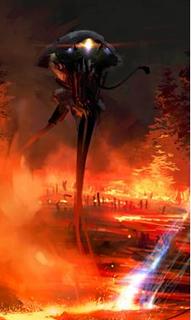

War of the Worlds, Peace, Power and Disaster
Only about a dozen years ago news commentators were speculating about the arrival of a Pax Americana--a period of global peace and prosperity that would follow the Cold War as the United States of America, at last the only super-power, presided over a "new world order." Such a hopeful phrase ... in the words of performance artist Laurie Anderson, it may not have been very specific, "but at least it promised to be something new, and worldwide, and orderly."
The reality has turned out to be something less than peaceful, all too familiar, and far from orderly, though certainly worldwide. America has emerged as an empire, and not a very nice one. Plagued like ancient Rome by "barbarians" at home and abroad, it has lashed out and in the process rediscovered the limits of military force.
Perhaps this sense of inadequacy is haunting us as a nation. That could explain the compelling nature of Steven Spielberg's remake of H. G. Wells' War of the Worlds. Though shrill (someone should explain to the Tom Cruise character that the best way to calm a hysterical child is NOT to yell at her), it is nevertheless a vivid portrayal of what happens when society breaks down in the face of something it cannot control. The aliens are as technologically superior to us as, let's say, a cruise missile is to a cavalry charge on camel back. In one stroke--a scientifically accurate electromagnetic pulse--all communication and transportation is knocked out, reducing us to the status of vermin ready to be symbolically stepped on by the strides of the towering alien machines. Instantly, it's everyone for themselves.
This is an interesting contrast to what happened only a couple of years ago when our President visited Hollywood to get them to help whip up some war fever. There was a marked increase in the production of heroic new films, and an immediate abundance of old ones unearthed to be aired on television. A particular favorite of mine was Paul Verhoeven's take on Robert Heinlein's Starship Troopers, where the infantry heroes battle giant insects (the perfectly dehumanized enemy) in a landscape uncannily like that of Afghanistan. It didn't seem to bother anyone that the world government on earth had the militaristic trappings of the Third Reich, or that citizenship was not universal but had to be earned by things like, well, military service for example. Legislation anyone?
But it doesn't take a war or a superior enemy to deliver the nightmare of national impotence. Look what a handful of terrorists were able to do by redirecting the paths of a few airplanes. And see how we throw up our hands in helplessness when confronted with the wholesale destruction of a city by the natural forces of wind and water. Pulling triggers is easy compared to providing for the human needs of human beings. When we stop taking aim and start taking time to tend to the real needs of those at home and abroad, maybe then historians will be able to identify the Pax that emerged from this chaos, and to name a date when we finally outgrew our need to be powerful.
Sunday, September 04, 2005
The World of Wars
Posted by
The Nort
at
10:30 PM
![]()
![]()
Labels: movies, science fiction, World War
Subscribe to:
Post Comments (Atom)









No comments:
Post a Comment